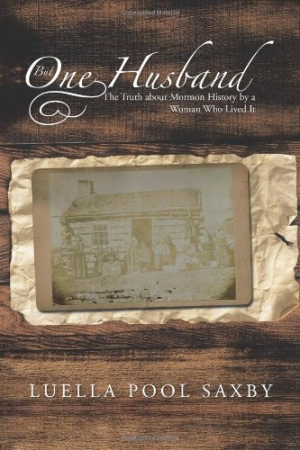But One Husband
The Truth about Mormon History by a Woman Who Lived It
Sarah Ann Thirkell was born in 1837 in Yorkshire, England. She grew up in that damp and foggy place in a family near the bottom of the English class system; she came to yearn for a life free of subservience to the whims of the ruling class in “a land of moist, scented air and fairy-like grottoes lining the shores of the Great Salt Lake.”
Like many other English families of that time, Sarah’s family was an easy target for missionary proselytizers of the fledging Mormon faith who promised “universal brotherhood and the sense of one for all and all for the glory of God and his kingdom of Zion.”
Sarah, her parents, and her three sisters were among 332 of the newly converted who sailed from Liverpool to New Orleans and then traveled onward by wagon, horse, mule, and foot to Utah. Anticipating a utopian Zion, they found harsh conditions, an unforgiving landscape, broken promises, and the specter of polygamy.
Sarah’s granddaughter, Luella Pool Saxby, who died in 1989, spent twenty-five years writing But One Husband, relying mainly on her grandmother’s diaries. It was well worth the effort.
The book is a model for its genre. It is a story of a family’s travails and disappointments, but it is also, in a broader sense, the unvarnished story of what life was like for early settlers of the American West. Vintage photographs from the 1850s and 1860s dramatize those times. Both in subject and language, it recalls Willa Cather’s O Pioneers! Details enrich the narrative: Dinner plates are set face down to be turned up when the food is served, and a sweet potato is used to plug an oil-can spout.
There is a novel defense of polygamy included, as outlined in a Mormon newspaper of the time: If a man of nineteen took forty wives and his sons did likewise, by the time he was sixty-eight, his family would number 3,580,441 “righteous seed upon earth.” One of Sarah’s own sons wrestled with the issue of polygamy and rejected it, and she observes that “polygamy can be lived, but only where there is no love.”
Sarah Ann Thirkell was the only wife of John Saxby. The couple had fourteen children, but premature birth, diphtheria, mysterious stomach disorders, and work accidents claimed five of them.
The issue of polygamy as well as the inequities of strict Mormon governance—such as the best land, the most money, and even the freshest groceries going to the church’s ruling elite—eventually led Sarah and her family to abandon Mormonism and move to California. It is bittersweet to note that, in her old age, Sarah’s fondest memories were of her childhood in Yorkshire.
Reviewed by
Tom Bevier
Disclosure: This article is not an endorsement, but a review. The publisher of this book provided free copies of the book and paid a small fee to have their book reviewed by a professional reviewer. Foreword Reviews and Clarion Reviews make no guarantee that the publisher will receive a positive review. Foreword Magazine, Inc. is disclosing this in accordance with the Federal Trade Commission’s 16 CFR, Part 255.

